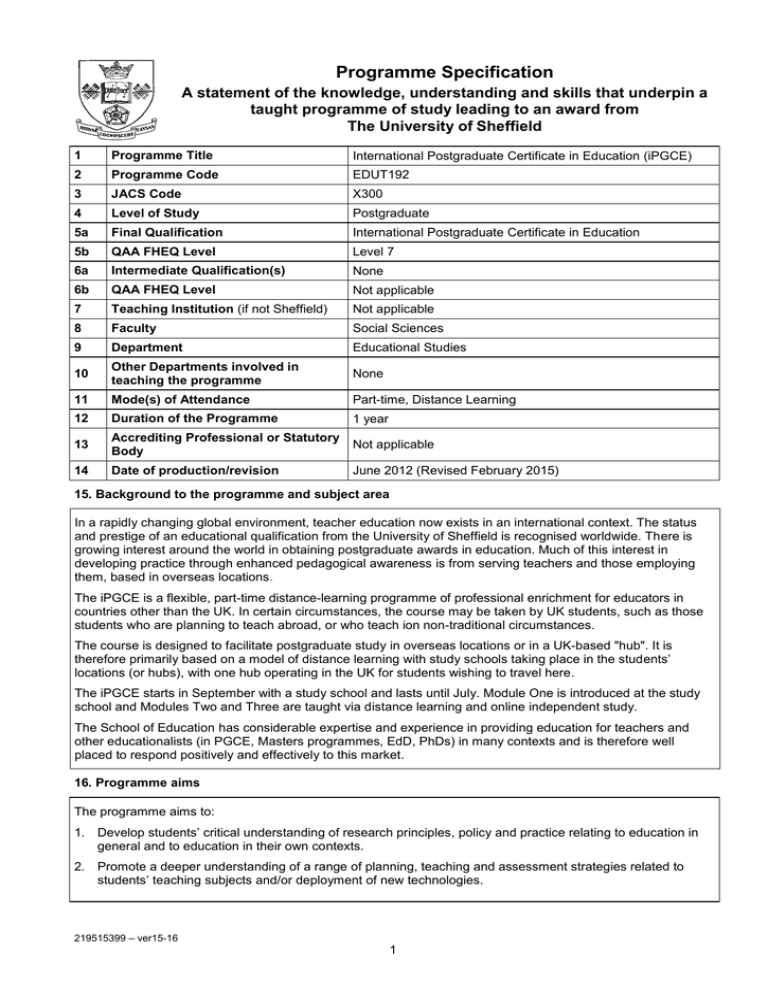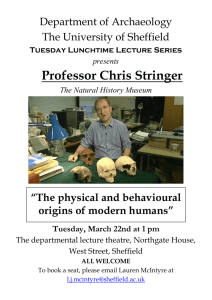Programme Specification
advertisement

Programme Specification A statement of the knowledge, understanding and skills that underpin a taught programme of study leading to an award from The University of Sheffield 1 Programme Title International Postgraduate Certificate in Education (iPGCE) 2 Programme Code EDUT192 3 JACS Code X300 4 Level of Study Postgraduate 5a Final Qualification International Postgraduate Certificate in Education 5b QAA FHEQ Level Level 7 6a Intermediate Qualification(s) None 6b QAA FHEQ Level Not applicable 7 Teaching Institution (if not Sheffield) Not applicable 8 Faculty Social Sciences 9 Department Educational Studies 10 Other Departments involved in teaching the programme None 11 Mode(s) of Attendance Part-time, Distance Learning 12 Duration of the Programme 1 year 13 Accrediting Professional or Statutory Body Not applicable 14 Date of production/revision June 2012 (Revised February 2015) 15. Background to the programme and subject area In a rapidly changing global environment, teacher education now exists in an international context. The status and prestige of an educational qualification from the University of Sheffield is recognised worldwide. There is growing interest around the world in obtaining postgraduate awards in education. Much of this interest in developing practice through enhanced pedagogical awareness is from serving teachers and those employing them, based in overseas locations. The iPGCE is a flexible, part-time distance-learning programme of professional enrichment for educators in countries other than the UK. In certain circumstances, the course may be taken by UK students, such as those students who are planning to teach abroad, or who teach ion non-traditional circumstances. The course is designed to facilitate postgraduate study in overseas locations or in a UK-based "hub". It is therefore primarily based on a model of distance learning with study schools taking place in the students’ locations (or hubs), with one hub operating in the UK for students wishing to travel here. The iPGCE starts in September with a study school and lasts until July. Module One is introduced at the study school and Modules Two and Three are taught via distance learning and online independent study. The School of Education has considerable expertise and experience in providing education for teachers and other educationalists (in PGCE, Masters programmes, EdD, PhDs) in many contexts and is therefore well placed to respond positively and effectively to this market. 16. Programme aims The programme aims to: 1. Develop students’ critical understanding of research principles, policy and practice relating to education in general and to education in their own contexts. 2. Promote a deeper understanding of a range of planning, teaching and assessment strategies related to students’ teaching subjects and/or deployment of new technologies. 219515399 – ver15-16 1 3. Develop students’ understanding of the relationship between research and practice and develop their own ability to conduct rigorous classroom-based research or policy analysis. 17. Programme learning outcomes Knowledge and understanding: On completion of the iPGCE programme, students will be able to demonstrate: K1 Knowledge and understanding of educational theory and key research in both general, educational and subject-specific fields and their application in educational contexts. K2 Critical understanding of educational principles and policy (both general and contextual) and their impact on teaching and learning in an institutional context. K3 Critical understanding of the nature of practitioner research and its application to their own practice in the field of education. K4 Knowledge and understanding of the pedagogical implications arising from distance learning practices. Skills and other attributes: On completion of the iPGCE programme, students will be able to demonstrate: S1 An ability to synthesise theory, research, policy and practice, drawing on relevant literature, and developing a clear and sustained argument. S2 A critical approach to educational literature, and an ability to evaluate and reflect on its implications for their own personal theories and practices. S3 An ability to express clearly, coherently and reflexively their positions with regard to theory, research, policy and practice. S4 An ability to apply research skills in order to develop their own practice. 18. Teaching, learning and assessment Development of the learning outcomes is promoted through the following teaching and learning methods: The programme’s teaching is research-led. It makes reference to cutting-edge research in pedagogy and draws on staff’s own research activity whilst also encouraging the development of students’ own research skills in relation to their practice. Students are encouraged to take responsibility for their own professional development, learning to analyse their own teaching, assess their pupils’ learning, and reflect on the implications for improvement. They are also encouraged to adopt a rigorous, research-driven approach, which enables them to innovate, evaluate critically and enhance learning standards. The course is conducted primarily via distance learning with an initial face-to-face study school in the students’ own location or hub - one central hub will be located in the UK. Students are introduced to blended teaching and learning practices using a range of on-line resources, peer discussions and individual tutorials. Development of learning outcomes is promoted through the following teaching and learning methods: Face-to-face study school At the time of writing, one central study school hub will be situated in the UK, at the University of Sheffield, with plans being considered for hubs in Iran, Greece, Malta and China. http://www.sheffield.ac.uk/education/ipgce Seminars feature a range of student-led and tutor-led activities aimed at: developing students’ pedagogical knowledge and understanding; promoting reflection and analysis through discussion and questioning; developing students’ ability to reason effectively and communicate arguments and points of view clearly and professionally; addressing matters related to assessment. Tutorials This method, facilitated by internet-based technologies (Skype, and/or other online digital communication 219515399 – ver15-16 2 software such as FaceTime) provides opportunity for individualised and group communication with tutors on a range of content- and assessment-based issues related to student module assessment activities and other issues emerging from student led enquiry. Independent Study This method is fundamental to and continuous throughout the course. Students will critically engage with, reflect on and formulate perspectives on important issues and debates concerning teaching, schools and education from relevant academic and other literatures. The iPGCE will have a dedicated space on MOLE comprising online study units, video presentations and other teaching- and research-related materials and resources. Independent enquiry will have a collaborative dimension in a community of practice experienced through dialogue and debate in a range of study school and independent activities facilitated technologically via instruments such as Skype and/or other online digital communication software such as FaceTime. Opportunities to demonstrate achievement of the learning outcomes are provided through the following assessment methods: There will be a range of assessed and non-assessed tasks and assignments corresponding to the three teaching modules. 19. Reference points The learning outcomes have been developed to reflect the following points of reference: University of Sheffield Strategic Plan 2010-2015 University of Sheffield Mission, Vision and Identity University of Sheffield Learning and Teaching Strategy 2011-16 Faculty of Social Sciences Proposition (July 2011) School of Education Strategic Plan 2009-15 20. Programme structure and regulations The iPGCE course is designed to facilitate postgraduate study in flexible locations, including overseas. It is therefore primarily based on a model of distance learning with initial study schools taking place in the students’ locations (or hubs), or in the central UK hub at the University of Sheffield. The course starts in September with a study school and lasts until July. Module One is introduced at the study school and Modules Two and Three are taught via distance learning and online independent study. Module One (Teaching and Learning Part One) consists of an introduction to general principles within education, including teaching, planning, assessment, and policy. The written assignment for this module is submitted in December. Module Two (Teaching and Learning Part Two) consists of an online module that allows students to pursue an issue or area related to their own context and/or subject with the aim of furthering subject-pedagogical knowledge and understanding critical reflection. The written assignment for this module is submitted in late March. Module Three (Small-scale Study) allows students to carry out a piece of classroom- or school-based research. The written assignment for this module is submitted in early June. Detailed information about the structure of programmes, regulations concerning assessment and progression and descriptions of individual modules are published in the University Calendar available on-line at http://www.shef.ac.uk/govern/calendar/regs.html. 219515399 – ver15-16 3 21. Student development over the course of study After the initial study school, where students meet their tutors and their peers in a collaborative and exploratory context, students are expected to take responsibility for their own academic progress and professional development, thus becoming increasingly autonomous as the course progresses. Having been introduced to some of the critical skills needed for the academic study of education in the study school, distance learning and online methods (Skype, and/or other online digital communication software such as FaceTime) will support the students in managing the learning and assessment requirements for all three modules. Individual tutorial support (online) will be available throughout the duration of the course to support students in the development of their independent reflective and critical knowledge and understanding of educational principles and practice. 22. Criteria for admission to the programme Detailed information regarding admission to programmes is available from the University’s On-Line Prospectus at http://www.shef.ac.uk/courses/. A person may be admitted as a candidate who: a) is a recognised graduate in an appropriate discipline or has gained educational qualifications deemed acceptable by the Head of Department; or b) has completed not less than three years’ service in educational work approved by the Head of Department. IELTS 6.5 (with at least 5.5 in each part) or equivalent. Students should have a post in an educational context. 23. Additional information This specification represents a concise statement about the main features of the programme and should be considered alongside other sources of information provided by the teaching department(s) and the University. In addition to programme specific information, further information about studying at The University of Sheffield can be accessed via our Student Services web site at http://www.shef.ac.uk/ssid. 219515399 – ver15-16 4



